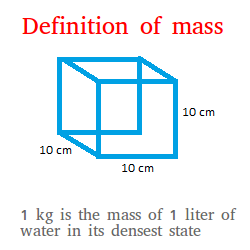Definition of mass
The definition of mass can be quickly understood with concrete examples. In a nutshell, mass is a measure of inertia.
Get a bucket and fill the bucket with q-tips. Get another bucket the exact same size as the other one and fill it with steel nails.
Kick both buckets with the same force and tell me which bucket moved further.
The bucket filled with q-tips moved further of course.
We say that the bucket filled with nails has a greater inertia.
In order words, the bucket filled with nails has a greater tendency to remain at rest.

This makes sense since the bucket with steel nails have a bigger mass.
In the same fashion, which one will you prefer to kick?
A soccer ball or a stone sphere the same size as the soccer ball?
Actually, don't try to kick the stone sphere. You may hurt yourself.
It is obvious though, even if you never kick the stone sphere, that you will be able to move the soccer ball easier with a kick.
Again, the stone sphere has a greater inertia.
Notice that I did not say the stone sphere is heavier than the soccer ball. Mass is not the same as weight.
When you think of mass of an object, don't think of heaviness. Think of how easy is it to move this object.
Mass is not the same as volume either. An object may have a large mass yet has a small volume.
Fill a small bag with sand. Fill a bigger bag with cotton candy.
The bigger bag will have a greater volume. However, it may be easier to drag the bag filled with cotton candy.
Another definition of mass
Mass is a measure of the amount of matter inside an object. An object can be quite small yet has a lot of matter inside of it.
A bar of gold for instance may be quite small and yet has a mass of 2 kilograms (kg)
Talking about kilogram, what is 1 kilogram?
One kilogram is the mass of 1 liter of water in its densest state.
Water is in its densest state when the temperature is close to 4 degrees Celsius.
The following cube will be able to hold 1 liter of water.

In math 1 liter = 1000 cm3
In the English system, 1 kg = 2.2 pounds. Therefore, if you could reproduce the experiment above, you will find out that the mass of the cube filled with water is 2.2 pounds or 1 kg.